人教版八年级英语上册导学案全册
人教版八年级英语上册导学案(全册)

全册导学案Unit 1 Where did you go on vacation?Section A 1a—1c内容:unit1 Where did you go on vacation? 课时:1课时英语组编写人:审核人:审批人;【学习目标】1、学会谈论过去发生的事件—学习一般过去时的用法2、掌握规则动词的变换规则3、熟记一些常用的不规则动词【学习重点、难点】1.复习一般过去时态的构成及用法;2.进一步学习一般过去时态针对地点的提问及回答;【学法指导】1、能向小组成员用英语介绍生活中的日常活动,如:stay at home , go to the beach, do my home work,watch TV, visit my uncle, go to New York, etc.2、运用一般过去时谈论过去的一天或一次旅行。
3.不规则动词过去式的归类记忆【教学过程】一、导入(启发探究 3分钟)StepA、试一试你能写出下列各词的过去式吗?stay_________ do_________ stop_________play_________is_________ go_______ buy_______ have _______like_________ visit_________ are_________ carry_________StepB、快乐译一译stay at home_________ go to summer camp_________go to New York city______ go to the mountains_________visit my uncle_________ go to the beach_________visit museums _______Step C、考考你的迁移能力1. Lucy usually______to school early. But today she ______to school late. (go)2一What___________you__________(do) on your vacation last year?--–We___________(play) on the beach.3.I______ (call) you just now. But there_______ (be) no answer.4.Where __________you(study) at home las night? 一No, I__________(help)my mother__________(clean) the room.5. The students of Class One go to see the old woman __________ (one) a month.Step D、answer the questions:How was your summer vacation ?Where did you go on vacation?Who did you go there with ?What did you do there ?二、自学(自主探究 6分钟)Step 1c师生、生生操练Where did you go on vacation? I went to New York City.Did you go out with anyone? No, No one was here. Everyone was on vacation. Did you buy anything special? Yes, I bought something for my father. How was the food? Everything tasted really good.Did everyone have a good time? Oh,yes. Everything was excellent. 三、交流(合作探究 10分钟)Step 1a Reciting1.Read the phrases and know their meanings.stay at home_________ go to summer camp_________go to New York city______ go to the mountains_________visit my uncle_________ go to the beach_________visit museums _______2.finish the task:match the activities with the pictures.3.check the answers.4. students read and remember the phrases.Step 1b Listening1.students read the names.2. students guess their activities.3. finish the task:4. check the answers.5. students read and know the mmeaning of this passage.四、总结(引深探究 15分钟)I、语法:一般过去时态的运用1.带有确定的过去时间状语时,要用过去时如:two days ago…、last yearin the old days just nowwhen I was 8 years old yesterdayDid you have a party yesterday?2 表示过去连续发生的动作时,要用过去时这种情况下,往往没有表示过去的时间状语,而通过上下文来表示。
人教版八年级英语上册教案导学案全册

八年级英语上册教案导学案全册Unit1 Where did you go on vacationSection A集中识词【学习目标】:1,掌握重点单词的用法2,掌握重点句型:Where did you go on vacation?Did you go anywhere interesting?【学习重点】:一般过去时的复习【课前预习】:看P7,8,完成下列单词:(一个两遍)1. 任何人______________________2. 任何地方____________________3.精彩的__________________4.很少____________________5.大多数_____________________6. 某物;某事__________________7.没有什么____________________8.每人___________________9.我自己__________________________ 10. 你自己____________________11. 母鸡_________________12.猪_____________________________ 13.好像______________________14.厌烦的___________________15.某人_________________________ 16.日记______________________二.完成下列短语:(一个一遍)1. 相当多____________________2. 去度假___________________3.为考试而学习__________________4.照相____________________5.购物_____________________6.记日记__________________________7.当然__________________8.夏令营_________________9.出去___________________________10.第一次______________________11.在农村_________________________的内容,掌握并完成下列知识。
八年级上册英语全册导学案(人教版)
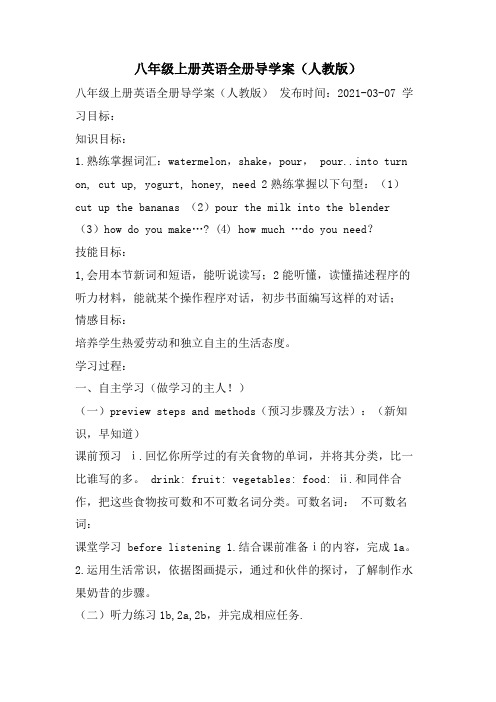
八年级上册英语全册导学案(人教版)八年级上册英语全册导学案(人教版)发布时间:2021-03-07 学习目标:知识目标:1.熟练掌握词汇:watermelon,shake,pour, pour..into turn on, cut up, yogurt, honey, need 2熟练掌握以下句型:(1)cut up the bananas (2)pour the milk into the blender (3)how do you make…? (4) how much …do you n eed?技能目标:1,会用本节新词和短语,能听说读写;2能听懂,读懂描述程序的听力材料,能就某个操作程序对话,初步书面编写这样的对话;情感目标:培养学生热爱劳动和独立自主的生活态度。
学习过程:一、自主学习(做学习的主人!)(一)preview steps and methods(预习步骤及方法):(新知识,早知道)课前预习ⅰ.回忆你所学过的有关食物的单词,并将其分类,比一比谁写的多。
drink: fruit: vegetables: food: ⅱ.和同伴合作,把这些食物按可数和不可数名词分类。
可数名词:不可数名词:课堂学习 before listening 1.结合课前准备ⅰ的内容,完成1a。
2.运用生活常识,依据图画提示,通过和伙伴的探讨,了解制作水果奶昔的步骤。
(二)听力练习1b,2a,2b,并完成相应任务.二、合作交流:co-operation.( 三个臭皮匠,顶个诸葛亮,two heads are better than one.) 小组练习对话1c,2c。
三、展示点拨:display (弘扬个性,展示讲解,让我们共同提供成功的喜悦!)role play the conversations in 1c and 2c. show to the classes.四、稳固提升:exercise in class (别低估了自己的潜力!)根据首字母提示补全单词,使句子完整通顺。
人教版八年级英语上册导学案(全册)
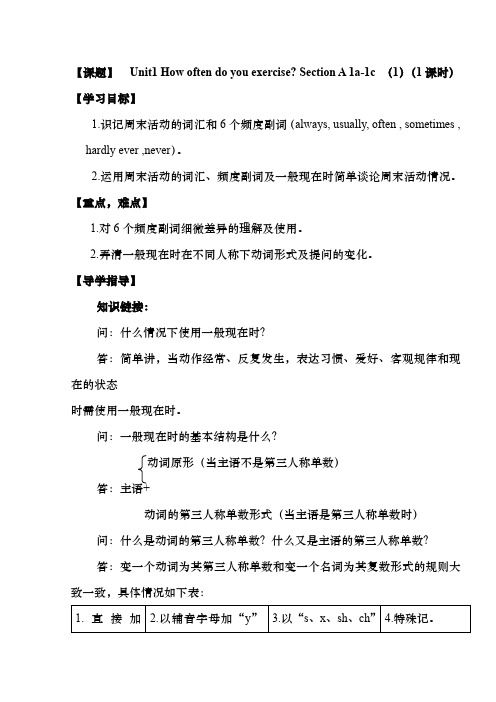
always从不,决不★
often几乎不☆(no star)
2.小组交流学习成果并讨论下列按频率高低顺序排列的表达是否正确(正确写T,错误写F)?若不正确,给出正确表达。
always>often>usually>sometimes>hardly ever>never.____
______>______>_____>______>_______>____.
5.Pair Work Show(展示对话)。
【课堂练习】
一、口译“自主学习一”所列词汇。
二、用所给词的适当形式填空。
1.Do you know Zhang Yining?Her ______(one)name is Yining and she surfs the Internet ______(one) a week.
【课题】Unit1 How often do you exercise? Section A1a-1c(1)(1课时)
【学习目标】
1.识记周末活动的词汇和6个频度副词(always, usually, often , sometimes , hardly ever ,never)。
2.运用周末活动的词汇、频度副词及一般现在时简单谈论周末活动情况。
知识链接:
一、将一个句子变为否定句的三个步骤:1、在要求变为否定句的句子中寻找be动词am、is、are、was、were,若有其中某个的话,在其后边加not即可(也可将其两个词缩写:is not=isn’t;are not=aren’t;was not=wasn’t;were not=weren’t)。2、若在要求变为否定句的句子中找不到am、is、are、was、were,就在其中寻找情态动词can、may、must、should、will、would、could、shall等,若有其中某个的话,就在其后加not即可(也可根据需要将其缩写:can not=can’t,must not=mustn’t, will not=won’t)。3、若在要求变为否定句的句子也找不到情态动词,就借助助动词do、does、did,第三人称单数借助does,不是第三人称单数借助do,一般过去时借助did,并在其后加not(分别可缩写成don’t、doesn’t、didn’t)后边的动词打回原形。
八年级上册英语全册导学案(人教版)
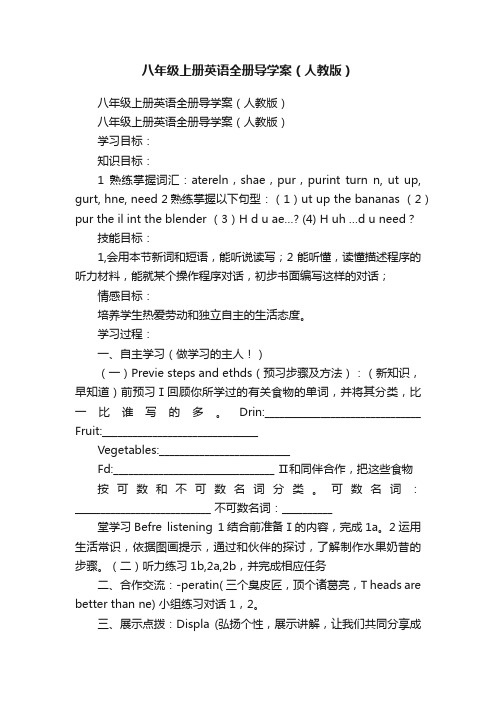
八年级上册英语全册导学案(人教版)八年级上册英语全册导学案(人教版)八年级上册英语全册导学案(人教版)学习目标:知识目标:1熟练掌握词汇:atereln,shae,pur,purint turn n, ut up, gurt, hne, need 2熟练掌握以下句型:(1)ut up the bananas (2)pur the il int the blender (3)H d u ae…? (4) H uh …d u need?技能目标:1,会用本节新词和短语,能听说读写;2能听懂,读懂描述程序的听力材料,能就某个操作程序对话,初步书面编写这样的对话;情感目标:培养学生热爱劳动和独立自主的生活态度。
学习过程:一、自主学习(做学习的主人!)(一)Previe steps and ethds(预习步骤及方法):(新知识,早知道)前预习Ⅰ回顾你所学过的有关食物的单词,并将其分类,比一比谁写的多。
Drin:_______________________________ Fruit:_______________________________Vegetables:__________________________Fd:________________________________ Ⅱ和同伴合作,把这些食物按可数和不可数名词分类。
可数名词:___________________________ 不可数名词:__________堂学习Befre listening 1结合前准备Ⅰ的内容,完成1a。
2运用生活常识,依据图画提示,通过和伙伴的探讨,了解制作水果奶昔的步骤。
(二)听力练习1b,2a,2b,并完成相应任务二、合作交流:-peratin( 三个臭皮匠,顶个诸葛亮,T heads are better than ne) 小组练习对话1,2。
三、展示点拨:Displa (弘扬个性,展示讲解,让我们共同分享成功的喜悦!)Rle pla the nversatins in 1 and 2 Sh t the lasses四、巩固提升:Exerise in lass (别低估了自己的潜力!)根据首字母提示补全单词,使句子完整通顺。
人教版八年级英语上册导学案(全册)

【课题】Unit5 Can you come to my party? Section A 1a-1c(1)(1课时)【学习目标】1.学会邀请别人并根据自己的安排欣然接受别人的邀请或礼貌拒绝别人的邀请。
2.能给出不能接受别人邀请的具体理由。
3.提高自己的听、说能力。
【重点,难点】掌握做出、接受和拒绝邀请的习惯用句;使用“have/has to”给出不能接受邀请的原因。
【导学指导】温故知新一、阅读课本94页“1.动词的种类”及95页上“2情态动词”,完成下列问题。
1.请在横线上罗列5个情态动词。
______________________________________________________________________________2.“must”表示“必须”,否定式缩写为________,其含义为_____________。
若表示“不必,没必要”应该使用_______________或______________。
3.He can play the piano very well.(变为否定句)He _______ play the piano very well.4.I must finish my homework today.(变为疑问句)—______ I finish my homework today?—No, you ________./____________________.二、完成1a的要求(将图片和短语匹配起来)。
然后大声朗读它们。
自主互助学习一、合上课本,试着翻译下列词组。
看看你是不是个健忘的家伙,这些短语可都是曾经的“老熟人”啊!1. 拜访我的阿姨_______________;2. 去看医生________________;3. 帮助我的父母_________;4. 上钢琴课___________________;5. 为考试学习_______________;6.在星期六下午______________。
最新人教版英语八年级上册全册导学案word版(102页
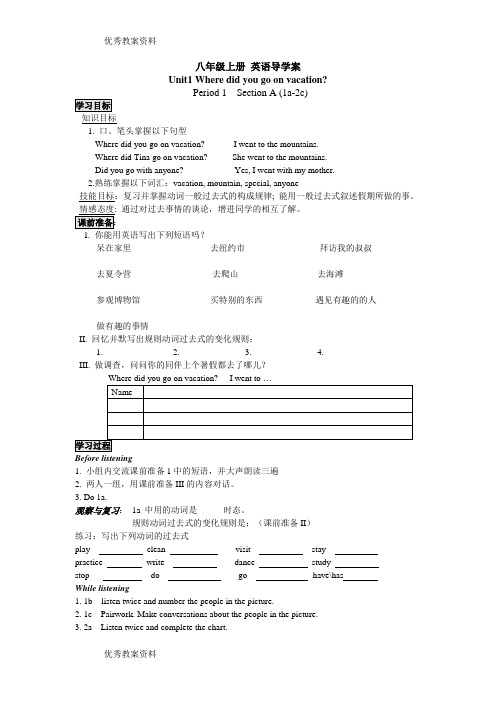
八年级上册英语导学案Unit1 Where did you go on vacation?Period 1 Section A (1a-2c)知识目标1. 口、笔头掌握以下句型-Where did you go on vacation? -I went to the mountains.-Where did Tina go on vacation? -She went to the mountains.-Did you go with anyone? -Yes, I went with my mother.2.熟练掌握以下词汇:vacation, mountain, special, anyone技能目标:复习并掌握动词一般过去式的构成规律; 能用一般过去式叙述假期所做的事。
通过对过去事情的谈论,增进同学的相互了解。
1. 你能用英语写出下列短语吗?呆在家里_________ 去纽约市_________ 拜访我的叔叔_________去夏令营_________ 去爬山_________ 去海滩_________参观博物馆_________ 买特别的东西_________ 遇见有趣的的人_________做有趣的事情_________II. 回忆并默写出规则动词过去式的变化规则:1.______________2. ______________3. ______________4. ______________III. 做调查,问问你的同伴上个暑假都去了哪儿?Before listening1. 小组内交流课前准备1中的短语,并大声朗读三遍2. 两人一组,用课前准备III的内容对话。
3. Do 1a.观察与复习:1a 中用的动词是______时态。
规则动词过去式的变化规则是:(课前准备II)______________________While listening1. 1b listen twice and number the people in the picture.2. 1c Pairwork. Make conversations about the people in the picture.3. 2a Listen twice and complete the chart.4. 2b Listen twice again and check Yes or No for each question.5. 模仿秀:听录音中的重点句段,反复跟读,模仿语音语调。
【八年级】人教版八年级英语上册全册导学案
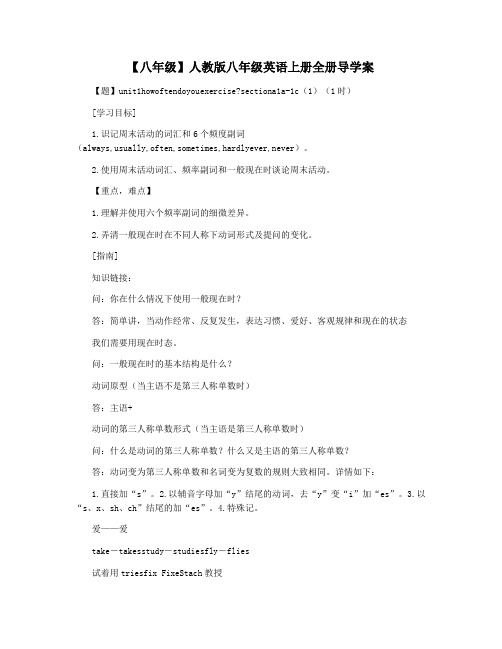
【八年级】人教版八年级英语上册全册导学案【题】unit1howoftendoyouexercise?sectiona1a-1c(1)(1时)[学习目标]1.识记周末活动的词汇和6个频度副词(always,usually,often,sometimes,hardlyever,never)。
2.使用周末活动词汇、频率副词和一般现在时谈论周末活动。
【重点,难点】1.理解并使用六个频率副词的细微差异。
2.弄清一般现在时在不同人称下动词形式及提问的变化。
[指南]知识链接:问:你在什么情况下使用一般现在时?答:简单讲,当动作经常、反复发生,表达习惯、爱好、客观规律和现在的状态我们需要用现在时态。
问:一般现在时的基本结构是什么?动词原型(当主语不是第三人称单数时)答:主语+动词的第三人称单数形式(当主语是第三人称单数时)问:什么是动词的第三人称单数?什么又是主语的第三人称单数?答:动词变为第三人称单数和名词变为复数的规则大致相同。
详情如下:1.直接加“s”。
2.以辅音字母加“y”结尾的动词,去“y”变“i”加“es”。
3.以“s、x、sh、ch”结尾的加“es”。
4.特殊记。
爱——爱take―takesstudy―studiesfly―flies试着用triesfix FixeStach教授wash―washesgo―goes;do―does;have―has主语的第三人称单数形式指除“你”和“我”之外的所有个人、事物或不可数事物。
自主互助学习一、自学:1.仔细观察本第一页图片,根据所给例子填写下列空格。
例:图片a:商店whatisthegirlinpictureadoing?sheisshopping。
pictureb:_______abook女孩在干什么?______________________________picturec:________________________________________?________________________________.pictured:______________________________________________?________________________________.图片用户:______________________________________________?________________________________.2.根据汉语提示,完成下列其他weekendactivity(周末活动)短语。
- 1、下载文档前请自行甄别文档内容的完整性,平台不提供额外的编辑、内容补充、找答案等附加服务。
- 2、"仅部分预览"的文档,不可在线预览部分如存在完整性等问题,可反馈申请退款(可完整预览的文档不适用该条件!)。
- 3、如文档侵犯您的权益,请联系客服反馈,我们会尽快为您处理(人工客服工作时间:9:00-18:30)。
【课题】 Unit1 How often do you exercise? Section A 1a-1c (1)(1课时)【学习目标】1.识记周末活动的词汇和6个频度副词(always, usually, often , sometimes , hardly ever ,never )。
2.运用周末活动的词汇、频度副词及一般现在时简单谈论周末活动情况。
【重点,难点】1.对6个频度副词细微差异的理解及使用。
2.弄清一般现在时在不同人称下动词形式及提问的变化。
【导学指导】知识链接:问:什么情况下使用一般现在时?答:简单讲,当动作经常、反复发生,表达习惯、爱好、客观规律和现在的状态 时需使用一般现在时。
问:一般现在时的基本结构是什么?动词原形(当主语不是第三人称单数) 答:主语+ 动词的第三人称单数形式(当主语是第三人称单数时) 问:什么是动词的第三人称单数?什么又是主语的第三人称单数?物。
自主互助学习 一、自学:1.仔细观察课本第一页图片,根据所给例子填写下列空格。
例:Picture a (图a ): shop What is the girl in Picture a doing? She is shopping. Picture b :_______ a book What is the girl in Picture b doing? ______________________________ Picture c :________ ________________________________?________________________________. Picture d :________ ______ ________________________________? ________________________________. Picture e :________ _______ _______________________________? ________________________________. 2.根据汉语提示,完成下列其他weekend activity (周末活动)短语 。
去购物_______________; 去钓鱼_______________; 去徒步旅行_______________;去看电影______________;去踩滑板_______________;去滑冰________________;去游泳__________________; 打篮球__________________; 弹钢琴______________;看望外祖父母__________________;为考试学习______________; 帮父母做家务__________。
二、展示交流1.小组内交流自主互助学习成果。
2.老师以男女或大组等形式通过问答形式交流自学1;通过提问式与学生交流自学2。
(自主互助学习当中的1和2) 三、合作探究1.将下列频度副词与其对应的汉语意思及星级数匹配在一起。
hardly ever经常 ★★★★★ usually 通常 ★★★★ sometimes 总是 ★★★ never 有时候 ★★ always 从不,决不 ★often 几乎不 ☆(no star )2.小组交流学习成果并讨论下列按频率高低顺序排列的表达是否正确(正确写T,错误写F)?若不正确,给出正确表达。
always >often >usually >sometimes >hardly ever >never .__________>______>_____>______>_______>____. 3.师生交流学习、讨论结果。
4.熟读、识记频度副词。
老师可指定6位同学代表6个不同的词,并要求他们在黑板前站成一排,要求学生“点名”,后打乱顺序要求学生快速“点名”。
也可给6位学生6个词的卡片,要求下边学生猜词。
5.学生弄清1b 题意后,老师播放录音。
(在学生读题过程中,老师务必要根据实际情况提供帮助。
) 【课堂练习】 一、英汉互译。
看书________________; 锻炼身体__________________; 去踩滑板________________;总是_______________; 通常____________________; 经常______________________; on weekends_________; how often_______________; hardly ever _________;sometimes___________; never____________________; go to the movies_______________;二、根据Model Conversation, 与搭挡make conversation(制作对话)。
Model Conversation: A:What do they do on weekends?B:They always go shopping.【要点归纳】1.一般现在时的使用。
2.Weekend activity 短语和频度副词。
【拓展练习】1. I often ___________(exercise) ,but my sister never ____________(exercise).(用正确形式填空)2. I exercise three times a day.(变为否定句) I __________ _________ three times a day3. She exercises twice a week.(变为一般疑问句)__________ _________exercise twice a week?4. I play the trumpet on weekends.(用he 改写句子) He ________ ________ _________ on weekends? 【总结反思】【课题】Unit1 How often do you exercise Section A 2a-2c? (2)(1课时)【学习目标】1.识记更多活动的词汇和具体频度副词短语,如:once a week(一个星期一次)。
2.运用更多活动的词汇、6个频度副词、不同的具体频度副词短语及一般现在时谈论生活学习中从事什么(what)活动及其频率(how often)。
【重点,难点】1.据自身情况灵活使用两种不同类型的副词。
2.据课文中所给具体频度副词短语创造新的具体频度副词短语。
3.弄清一般现在时在不同人称下动词形式及提问的变化。
【导学指导】温故知新:1.口译上节课所学的相关周末活动词汇及两种频度副词(可请一位学生提问其对应汉语,其他同学回答)。
2.朗读上一篇导学案中的词汇练习中的词汇。
知识链接:一、将一个句子变为否定句的三个步骤:1、在要求变为否定句的句子中寻找be动词am、is、are、was、were,若有其中某个的话,在其后边加not即可(也可将其两个词缩写:is not=isn’t;are not=aren’t;was not=wasn’t;were not=weren’t)。
2、若在要求变为否定句的句子中找不到am、is、are、was、were,就在其中寻找情态动词can、may、must、should、will、would、could、shall等,若有其中某个的话,就在其后加not即可(也可根据需要将其缩写:can not=can’t,must not=mustn’t, will not=won’t)。
3、若在要求变为否定句的句子也找不到情态动词,就借助助动词do、does、did,第三人称单数借助does,不是第三人称单数借助do,一般过去时借助did,并在其后加not(分别可缩写成don’t、doesn’t、didn’t)后边的动词打回原形。
例1:He is a teacher.(变否定句)He is not a teacher. 或He isn’t a teacher.例2:They can dance.(变否定句)They can not dance.或They can’t dance.例3:Jim likes pets. (变否定句)Jim does not like pets.或Jim doesn’t like pets.注意:例3中likes→like,即动词由第三人称单数形式打回为动词原形。
二、将一个句子变为一般疑问句也有三个步骤,且类似变否定句的规则。
即:将找到的be动词或情态动词提到句首,末尾加问号,若没有be动词或情态动词,同样的方法借助do、does、did,并将其提到句首,动词打回原形,末尾加问号。
注意:遇到some变any,并根据语境更改相应的人称和物主代词。
请将例1、例2、例3变为一般疑问句:例1_______________________.例2__________________________.例3______________________. 三、特殊疑问句的变法:通常对划线部分提问的过程就是变这个句子为特殊疑问句的过程。
基本结构:特殊疑问词+ 一般疑问句原则上划什么就用什么特殊疑问词。
例如:划时间就用when,划原因就用why,划方式就用how,划频率就用how often。
例4:She exercises twice a week.(对划线部分提问)How often does she exercise?特殊疑问词一般疑问句练习:Jim likes pets.(对划线部分提问)_______ ________ Jim like?自主学习:一、浏览2a、2c图表,翻译下列词语。
1.具体频度副词短语:一个星期一次______________ ; 一个月两次___________ ;每天________;一个月三次____________________; 一个星期五次____________;2.相关活动的词语:锻炼身体__________; 去看电影____________; 买东西__________________; 上网,网上冲浪____________________; 看电视____________; 看英语书____________________;最喜爱的节目____________________; 动物世界_________________。
二、听力。
1.浏览2a、2b题目,弄清题意。
(老师核对前可前后桌讨论学习结果)2.听录音,按要求完成2a、2b。
